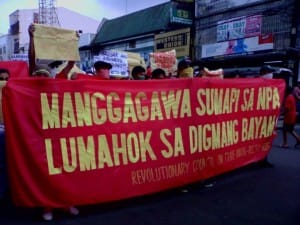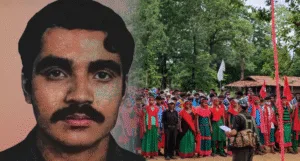By KATHERINE KRAMER
Programme Coordinator for Asia
Geneva Call
We take note of the NPA’s commitment to attain zero risk for the civilian population in its own mine use, specifically through the use of command-detonated devices. The landmine ban that Geneva Call is advocating for does not include command-detonated mines, and we have never said that it does. By their nature, command-detonated mines are not indiscriminate and therefore do not fall in the category of landmines banned by either the Deed of Commitment, nor the Mine Ban Treaty. Anti-vehicle mines are also allowed, as long as they can not be activated by a person (i.e. victim-activated). You are right, and we agree with you, when you say that you are allowed to direct command-detonated mines against military targets, including combat troops whether they are walking or riding in any military or military-commandeered vehicle.
Geneva, 4 November 2005
Mr. Fidel V. Agcaoili
Member, NDFP Negotiating Panel
Chairman, NDFP Human Rights Committee
RE: Your letter dated 27 October 2005
Dear Mr. Agcaoili,
Thank you very much for your reply and your clarifications. We apologise for any offence made as a result of the draft profile. We have corrected and revised your group’s profile to reflect the inaccuracies that you kindly pointed out to us.
It was never our intent to be an instrument in further spreading misinformation against national liberation movements. Our researchers compiled the profiles using different sources. Recognising the possibility that this information may not be accurate, we have sent the profiles to many of the groups themselves for comments, as we did with you, prior to the report going to print. If we were intent on discrediting the CPP/NPA/NDFP, we would not have consulted you. We would like to stress again that it was never our intent to incriminate either Prof. Sison nor other individuals and entities operating in the Netherlands, and we would like to thank you for pointing out the questionable wording in the profile.
We take note of the NPA’s commitment to attain zero risk for the civilian population in its own mine use, specifically through the use of command-detonated devices. The landmine ban that Geneva Call is advocating for does not include command-detonated mines, and we have never said that it does. By their nature, command-detonated mines are not indiscriminate and therefore do not fall in the category of landmines banned by either the Deed of Commitment, nor the Mine Ban Treaty. Anti-vehicle mines are also allowed, as long as they can not be activated by a person (i.e. victim-activated). You are right, and we agree with you, when you say that you are allowed to direct command-detonated mines against military targets, including combat troops whether they are walking or riding in any military or military-commandeered vehicle.
As long as the CPP/NPA/NDFP is not a signatory to the Deed of Commitment, it is by no means bound by the obligations there within. And, we have never stated otherwise. However, as more and more States become party to the anti-personnel Mine Ban Convention, the use of antipersonnel (victim-activated) mines is becoming more stigmatised internationally.
We are aware that while anti-personnel (victim-activated) landmines are not the most destructive weapon out there, they are one of the few that once deployed there is no control over who detonates it, and therefore are indiscriminate. They often times last long after a conflict has ended, endangering civilians as well as efforts at post-conflict reconstruction and development further damaging already fragile social and economic structures.
We have never said that governments don’t use weapons with grave consequences. We are, for instance, totally aware of the inhuman effects of cluster–bombs, which is why we are supporting the coalition lobbying against this weapon that is used in most cases by governmental forces. It’s not because we are engaged against anti-personnel mines, that we don’t support other organizations or coalitions working to end the use of other weapons. Our work is complementary to theirs.
As for the term non-State actor, it is an umbrella term that covers a wide range of armed actors and does not in any way change the inherent status the group(s) (i.e. if they have acquired the status of belligerency, it does not change this fact). Since the beginning of Geneva Call this has been a point of discussion. Many groups would like to be called differently, some of them guerrillas, others rebels, or liberation movements, or even “anti-state” actors. We chose this term to describe a plethora of actors, as it is neutral and used and understood among the international community and NGOs.
We have noted your allegations of mine use by the Philippine army, despite the Government’s obligations under the Mine Ban Convention, and have requested the Philippine Government to make an inquiry. We will be following up this request. It would be helpful if you could provide us with more specific information with regards to these allegations.
We regret that you will not be able to meet in Manila. However, Geneva Call’s President and myself would be very keen to meet with you in Utretch at a mutually convenient time to further discuss these issues.
Thank you again for your communication, and we do hope we will remain in touch.
Best regards,
KATHERINE KRAMER
Programme Coordinator for Asia
GENEVA CALL
HEADQUARTERS
P.O. Box 334
CH-1211 Geneva 4
Switzerland
TEL: ![]()

![]()
![]()
![]()
![]() + 41 22 879 1050
+ 41 22 879 1050![]()
FAX: + 41 22 879 1051
PARIS OFFICE
19 Rue Beranger
F-75003 Paris
France
TEL/FAX : ![]()

![]()
![]()
![]()
![]() +33 14 272 5549
+33 14 272 5549![]()
info@genevacall.org
www.genevacall.org





